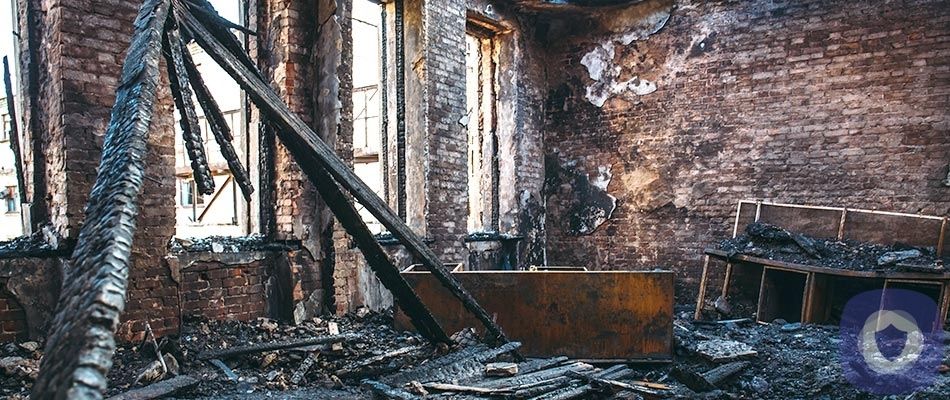In the United States, fire departments respond to one house fire about every 88 seconds, according to the National Fire Protection Association. We hope a house fire never happens to you, but knowing what to do if does could literally save your life.
What to do
Picture it now: A fire breaks out in your house. What do you do next? Here are the answers.
Stop the fire, if you can
A small fire, like a cooking fire, may quickly be resolved before it spreads by using a kitchen fire extinguisher. Not sure what to do? Follow the acronym PASS:
- Pull the pin. The locking pin should be removed with the nozzle facing away from you.
- Aim low. Target the base of the fire for more effective extinguishing.
- Squeeze the lever slowly. Keep the flow even.
- Sweep the nozzle from side to side.
If you’re not sure if you can stop the fire, or if you feel you or anyone else could be in danger, skip this step. In less than 30 seconds, a small fire can become a major one, so you want to focus on getting out safely.
Get out of the house quickly
Don’t worry about looking for important papers or valuable items. You and your family are the most valuable things you have. Just get out of the house ASAP. As you escape, remember some important safety precautions:
- Crawl low to the ground: Since smoke rises, you’ll be less likely to inhale dangerous amounts by staying low.
- Feel doorknobs before opening them: If the knob is hot, it means fire is behind it and could spread. Don’t open a door with a hot doorknob or that has smoke underneath it. Find a different way out.
- Open doors slowly: Be prepared to close them quickly if there’s heavy smoke or fire on the other side.
- Stop, drop and roll if your clothing catches fire: Roll over and over until the flame is extinguished.
Don’t go back inside the home for anything or anyone. Of course you’re concerned about others, but the most important thing you can do is call for help, not risk your life trying to help them without gear or training.
Call 9-1-1
Call the fire department as soon as you can. If you don’t have your cell phone, go to a neighbor’s house to call. Tell firefighters immediately if any people or pets are still inside and where they are, if you know.
What to do if you can’t get out of the house
Let’s say you can’t safely get out of the home. Close the door to the room you’re in and cover vents and cracks around doors with fabric or tape; this will help keep smoke out of the room as long as possible. Call for help if you can, and get close to a window. If you’ve got a light colored cloth, wave it; or flash a flashlight to get firefighters’ attention.
If you can get out safely but you can’t get to a family member or a pet, it’s important you leave so you can call for help.
If anyone gets burned, you can apply cool water to the wound and then cover it with a clean, dry cloth. Then, wait for paramedics to help.
After the fire is out, contact your insurance company
Your homeowner’s or renter’s insurance company will tell you exactly what your next steps should be in the aftermath of the fire. Call them to file a claim. They may be able to help you with living expenses and with cash flow, if you lost credit or debit cards in the fire. They may also recommend a cleaning and/or restoration service that they work with and/or what they cover as far as a place to stay.
Find a safe place to stay
Don’t enter your home until it’s been deemed safe. This could take quite some time, so you’ll need to find an alternate place to stay.
If your insurance does pay for a hotel, then you’ll want to make sure you choose based on what they’ll cover. If not, you may have to pay out of pocket or find a friend or family member to stay with. Disaster relief agencies such as the American Red Cross and the Salvation Army may be able to provide free shelter.
Handle your finances
There are some financial matters you’ll likely need to handle as well:
- Let your mortgage lender or landlord know about the fire. Your insurance company may make your payments for you while your home is being repaired, so check about that.
- Replace important cards and documents. This may include your credit and debit cards, if they were lost in the fire.
- Keep inventory of your belongings. Your insurance may pay for items that were damaged or ruined in the fire. Start a comprehensive list that include date of purchase, cost and description of each item.
- Save receipts. Keep records of all the money you spend on things such as food, clothing and hotel. You may need to file them with your insurance company and/or claim losses on your tax return.
Steps you can take to prevent house fires
Of course, prevention is always the best medicine, so you’ll want to safeguard your home against fires. Take these important steps, and you’ll go a long way toward preventing a house fire (or preventing injury or death in the event of one).
- Install and maintain smoke alarms. There should be a smoke detector on every floor of your home. Plus, in each bedroom and outside sleeping areas. Test smoke alarms each month to make sure they’re operational. Change batteries at least once a year.
- Consider getting a security system with fire detection included. With these, the security company is alerted when a smoke or heat detector goes off. Its monitoring team can dispatch emergency services quickly, without you having to even make a call. The time saved can be crucial in catching a fire early and getting everyone out of the home quickly.
- Also, consider getting a sprinkler system. These can be set to go off automatically in event of a fire.
- Sleep with bedroom doors closed. A closed door can keep fire from spreading to a room quickly.
See more tips in our article on tips for preventing a house fire.
To prepare for an emergency, practice an escape plan
The most important thing you can do is have an escape plan. Each room should have two ways out (such as a door and a window). Practice getting out of the house in the dark or with eyes closed twice a year.
With an escape plan in place, you won’t need to think hard about what to do in event of a house fire. Even if you’re panicking, that practice will come in very handy as your instincts and memory will take over and you’ll simply follow the plan .
This article has been reviewed and approved by Officer Banta.

Officer Banta is the official SecurityNerd home security and safety expert. A member of the Biloxi Police Department for over 24 years, Officer Banta reviews all articles before lending his stamp of approval. Click here for more information on Officer Banta and the rest of our team.

